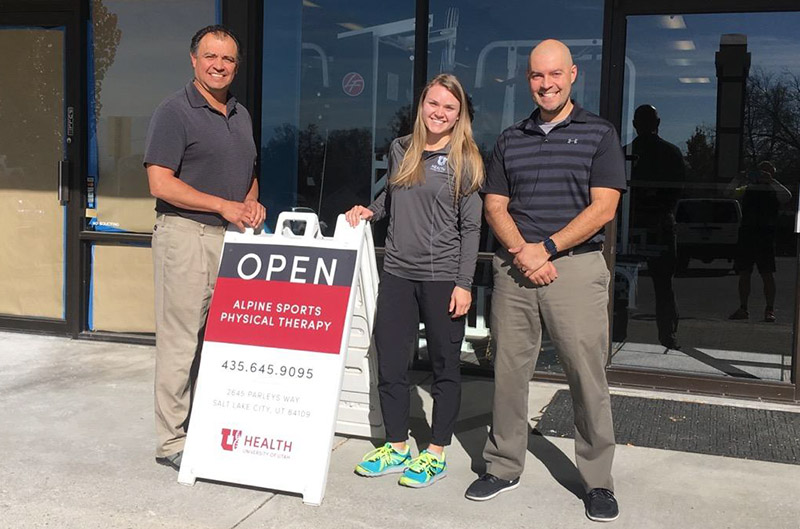Alpine Sports Physical Therapy in Salt Lake City
Alpine Sports Physical Therapy in Salt Lake City
2645 Parleys Way
Salt Lake City, UT 84109
PHONE: 801-581-4027
Get Directions
Treating Everyday Sprains, Strains, & Common Sports Injuries
Alpine Sports Physical Therapy—now part of University of Utah Health—is committed to providing comprehensive and customized care for all our patients. Our team of dedicated physical therapists wants to help you get back to the things you love—whether you're a professional athlete or an avid gardener.
We are located on the east side of Salt Lake City off of Parleys Way. The clinic is inside the Foothill Personal Training Center. At Alpine Sports Physical Therapy, we offer individualized physical therapy for many injuries, including sprains, strains, fractures, and more.

Why Choose U of U Health?
Our Alpine Sports Physical Therapy specialists have decades of experience combined with advanced doctorate-level training in physical therapy. We provide comprehensive, evidence-based treatments designed to improve your function and quality of life.
We take extra care to connect you with the physical therapist who best meets your needs and preferences. You will work with the same physical therapist at each appointment to allow for continuity of care and relationship-building. Each of our dedicated physical therapists shares a unifying goal—to get you back to the activities you love, free from aches and pains.
Physical Therapy Services
Alpine Sports Physical Therapy locations provide a full range of physical therapy services in a patient-friendly environment.
ASTYM® Therapy and Graston Techniques
Augmented soft tissue manipulation (ASTYM) and tissue remodeling (Graston technique) are treatments used to loosen soft tissues. A therapist uses both Graston and ASTYM devices to “scrape” stiff spots and loosen fascia around the joints and connective tissue that surrounds all your muscles. This non-surgical and injection-free therapy helps to relieve tension, stiffness, and pain caused by muscle scarring or degeneration.
Back and Neck Therapy
We have therapists who specialize in back and neck pain or injury. They use a range of techniques to correct posture, increase strength, or improve mobility. These services could benefit patients who have had surgery, have whiplash injuries, or have chronic back or neck conditions.
Concussions
Concussion therapy focuses on strength exercises, appropriate rest, and reducing symptoms such as headaches or dizziness. Our physical therapists follow specific protocols to help you safely return to sports or other activities after a concussion. We may prescribe specific stretches and exercises or use techniques like massage or electrical stimulation to increase blood flow and promote healing.
Dry Needling
We’ll insert tiny acupuncture needles into trigger points—painful, sensitive knots in your muscles. Your physical therapy plan may include a combination of treatments that include dry needling. It’s appropriate for anyone who has stiff, sore, or very tight muscles.
Hand Therapy
Certified hand therapists (CHTs) are occupational therapists who specialize in elbows, wrists, and hands. They offer a variety of treatments, including custom-fabricated splints, dynamic splints, and specialized hand exercises. You may need hand therapy to recover from an injury or while healing from surgery.
Manual Therapy
Manual therapy is a broad term for all the hands-on techniques physical therapists use. We may offer massage, joint mobilization (hands-on, gentle joint adjustments), or fascia manipulation (manual adjustments to connective tissue) to decrease pain, increase blood flow, and improve range of motion. Manual therapy often is part of your treatment plan, along with specialized exercises.
Neurologic Injury
You may need therapy to help increase your function after an injury to your brain, spine, or nerves, such as a stroke or seizure. A physical or occupational therapist can help you return to your activities of daily living safely. They may help with balance issues, fine motor skills, or mobility.
Neurologic Therapy
Neurologic therapy focuses on injuries or deficits of the nervous system, or nerves. For example, the neurons that send messages throughout your nervous system may not be working properly after knee surgery. We will use a range of exercises and electrical stimulation techniques to help your nerves work better so your body senses your movements and actions.
Orthopedics
Orthopedic physical therapy treats all injuries or conditions related to your major bones and joints, including your neck, back, shoulders, knees, and ankles. A physical therapist will prescribe specific exercises to increase mobility while decreasing pain and stiffness. Physical therapy is often a crucial part of recovering from an orthopedic injury.
Post-Surgical Rehabilitation
Your surgeon will likely refer you to physical therapy after orthopedic surgery. The physical therapist helps you recover well and regain your function safely. For example, we often work with patients after joint replacements to increase mobility and range of motion.
Selective Functional Movement and Corrective Exercise
This type of physical therapy focuses on functional movements to help you participate in specific activities, such as an active job or a hobby. We will pinpoint the root cause of your mobility challenges and then prescribe corrective exercises to increase your function.
Sports Rehabilitation
We treat injuries in athletes of all ages, from adolescents to geriatric patients. Our therapists also prescribe exercises designed to help you increase function and prevent injury in the sport you participate in, whether it’s skiing, volleyball, or running.
Vestibular Rehabilitation
Vestibular rehabilitation is a treatment for balance problems, dizziness, or vertigo. We prescribe specific exercises to help increase your balance and perform manual adjustments called canalith repositioning. Canalith repositioning is a technique used to move the particles in your ear that cause vertigo.
Find the Best Physical Therapists Near You
What to Expect at Your Appointment
You’ll need to arrive 15 minutes early for your initial physical therapy session to check in and fill out any necessary paperwork. Each session is 45 minutes and includes personalized treatments to meet your needs. Your therapist may use exercises, soft tissue massage, dry needling, or any other specialized service to decrease pain, promote healing, and improve your overall function.
Be sure to fill out all the forms included in your email reminder before your appointment. Checking in via MyChart and adding a payment method for your copay can make your visit even more efficient. Please notify us at least 24 hours in advance if you need to cancel or reschedule your appointment.
How to Make an Appointment
We advise that you check your insurance to find out if you need a physician referral before scheduling an appointment. Call 435-645-9095 to schedule an appointment.






